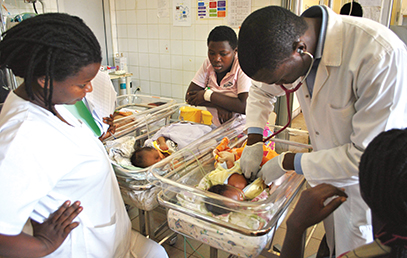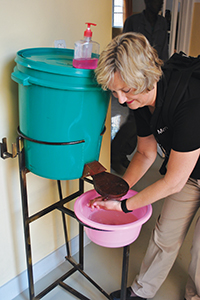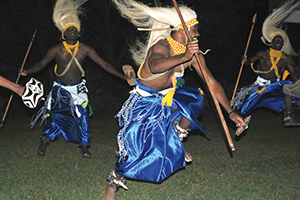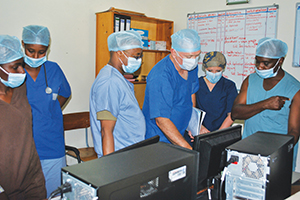Hospitals lacked toilets and sinks, hygiene protocols
John Nkuranga's son, Brian, was born in their African homeland with glaucoma in one eye. Doctors in Rwanda couldn't do much to help. When the family moved to Oklahoma City, Brian received treatment and his condition improved.

A Kigali physician assesses an infant in the neonatal intensive care unit at Rwanda Military Hospital.
That outcome inspired his father to change his career plans. At the time Nkuranga was pursuing a master's in business administration at Oklahoma Christian University. After he earned his MBA, he decided to continue studies in health administration at the University of Oklahoma so that when he returns to Rwanda he can work to improve his east African nation's rudimentary health system.
"I had begun asking myself, 'How can I use this opportunity to benefit the people back home?'" Nkuranga said. "People in Rwanda who can afford quality care go out of the country. People who can't often become disabled, or die."
International relations
Nkuranga, 42, has become the face of efforts by Mercy Hospital Oklahoma City to improve care at four hospitals in Kigali, the Rwandan capital. While he pursues his graduate education with a concentration in health policy and administration, he is employed at Mercy as director of Rwanda health care relations.
He joined the hospital in 2011 as a senior financial analyst, an opportunity that provided him with experience in many departments and administrative functions. He and his family plan to move back to Rwanda in 2017.
He also has served as a translator and guide during two of the three trips that Mercy clinicians and administrators have taken to Kigali in the past three years. In Kigali, the Mercy personnel work with hospital and government leaders to improve hygiene, patient identification and basic management procedures. That work continues with regular telephone conferences, usually with Nkuranga as translator and go-between, and in efforts to develop telemedicine technology that can link Rwandan caregivers to Mercy staff members. That initiative tops the agenda for a return visit by Nkuranga and other Mercy personnel, possibly later this year. Eventually, the telemedicine program will allow for direct contact between Mercy clinicians and Kigali patients, Nkuranga said.
The end game

Pam Spanbauer, part of a Mercy 4 Ubuzima group, uses a hand hygiene station at Muhima Hospital. These stations are used in health facilities without sinks and running water.
The Mercy teams that travel to Rwanda are called Mercy 4 Ubuzima, the Rwandan word for health.
"We want to help them develop long-term solutions to improving their health care," said Jim Gebhart, president of Mercy Hospital Oklahoma City. Employees have responded enthusiastically to the effort, from donating scrubs for Kigali hospital personnel to preparing detailed studies and recommendations for improvements in hospital management.
The relationship began with Mike O'Neal, board chairman at Mercy Hospital Oklahoma City and president emeritus of Oklahoma Christian University. Since 2006, the university has hosted students from Rwanda, including Nkuranga, and O'Neal has become a confidant of Rwandan President Paul Kagame. Nkuranga formerly was a staff assistant to Kagame.
Nkuranga enrolled in Oklahoma Christian in 2009 through a program between the university and Rwanda. After he decided to pursue health administration studies, O'Neal arranged for him to begin working at Mercy in 2011.
Rebuilding lives, infrastructure
Rwanda has struggled to recover from a series of ethnic massacres since it became independent in 1962. The worst was the genocide of 1994, when majority Hutus slaughtered about 800,000 Tutsis over three months. The Tutsis were the dominant ethnic group before and during the colonial period, when Rwanda was ruled by Germany and then Belgium. In the year of the genocide, the country's population was 7 million. As a military officer, Kagame led rebel forces that ended the genocide. He was elected president in 2000.
Nkuranga was born in 1973 in neighboring Uganda, where his Rwandan family had taken refuge. He and his family moved to Rwanda after the genocide. He attended college in Kigali and got married. His wife, Alexandrine, gave birth to their first two children there.
Gebhart and his wife, Karen, first traveled to Rwanda with O'Neal in 2012. He said the hospitals they visited needed such elementary hardware as toilets and sinks, and improvements in procedures such as hand washing and patient identification. He said some of the hospitals lacked many of the basic management policies that ensure proper hygiene.
"They didn't have the facilities or the protocols," Gebhart said. "The people there faced many challenges. A lot of basic infrastructure pieces were missing, and I don't just mean buildings."
Back to basics
When O'Neal's group returned home, Gebhart asked Mercy staff to begin working on ways to help. The hospital donated patient identification bracelets. In 2013, a delegation of more than 30 medical and administrative personnel, along with representatives of Baylor College of Medicine and Oklahoma Christian, returned to Rwanda for in-depth visits to the four hospitals.

Dancers entertain a Mercy group and other guests at a dinner hosted by the mayor of Kigali.
Gebhart said the participants decided they would be most useful in helping the Rwandan hospitals improve their management and operational procedures.
Among the problems they encountered, he said, were inconsistencies in language in hospital records. Many charts had entries in English, French and the Bantu language spoken by most Rwandans.
Mercy participants gathered ideas for improvements in procedures, including agreeing to use a single language for medical charts. (Nkuranga said there has been no decision yet on a charting language.) All told, they developed about 100 recommendations for ways in which hospital personnel in Kigali could improve management.
A third, smaller Mercy delegation returned to Rwanda in 2014 for follow-up. Ever since, hospital personnel have been working by telephone and email with their peers in Rwanda to put the recommendations into practice.
Nkuranga is in the middle of that work, both because he is bilingual and because of his goal of returning to Rwanda. Much of his efforts this year have been on the details of the telemedicine system.
"This is a great opportunity for Mercy to follow the healing ministry of Jesus and improve health care for a desperate people," he said. "We can establish links so that people here can exchange ideas in their fields and offer care to Rwanda."
He said the visits to Rwanda allowed personnel from Mercy to better understand his country's challenges and experience its beauty. He said he led them on visits to churches and to memorials to the genocide.
Pervasive poverty, hunger
One Mercy team member from the group in 2013 offered an observation during an employee assembly after the group returned home. Jamie Campbell, a nurse, recalled an exchange with a nurse/midwife named April. Campbell said they were reviewing a chart. "April was helping me because most of the chart was written in French and needed to be translated. As we were talking she looked at me and said, 'I know our workers sometimes seem unmotivated, but please understand they come to work hungry. Sometimes they have not had a meal for a day or two …'"

Mercy Clinic’s Dr. Jeff Reames, third from right, views an electronic health record at Rwanda Military Hospital in Kigali.
Testimonials such as Campbell's, which also was posted on the hospital website, help to explain employee enthusiasm for helping Rwanda, Gebhart said. Many have volunteered to travel to Rwanda as needed. The forums after the trips, such as the one when Campbell told her story, are well-attended.
"I hear a lot about how the employees are proud to work for an organization that would commit to an effort like this," Gebhart said. "They are part of helping a country get back on its feet."
Copyright © 2015 by the Catholic Health Association
of the United States
For reprint permission, contact Betty Crosby or call (314) 253-3477.